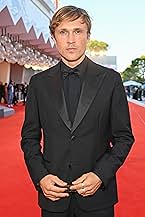In 1980s Naples, young Fabietto pursues his love for football as family tragedy strikes, shaping his uncertain but promising future as a filmmaker.In 1980s Naples, young Fabietto pursues his love for football as family tragedy strikes, shaping his uncertain but promising future as a filmmaker.In 1980s Naples, young Fabietto pursues his love for football as family tragedy strikes, shaping his uncertain but promising future as a filmmaker.
- Nominated for 1 Oscar
- 32 wins & 66 nominations total
Betty Pedrazzi
- Baronessa Focale
- (as Betti Pedrazzi)
- Director
- Writer
- All cast & crew
- Production, box office & more at IMDbPro
Featured reviews
It's been a long time since I've seen a great italien film, and i always say this "Sorrentino is the closest we're ever gonna have to Fellini". One of the realest, saddest and funniest movies of 2021!
Having seen four of Paolo Sorrentino's movies now, I have finally and regrettably seen enough to admit that I am not a fan of his work. For some reasons, his movies don't engage me enough emotionally to care. Le conseguenze dell'amore (The Consequences of Love) was an interesting look into the life of a man with a dark secret, but I believed that it would have worked better as a character study if the revelation at the end had come earlier in the movie. I liked Youth better, a modest and entertaining contemplation of ageing, even though as a 40-something, it didn't fully move me either.
His celebrated La Grande Bellezza (The Great Beauty) was voted Best Movie of the Year by many, but it left me puzzled, as I saw little more than short vignettes about Roman life without much of an overall encompassing idea, story thread or theme. I watched it again to make sure that I didn't miss anything, but my response was largely the same: lots of eye candy with little nutritional value for the mind. And that is probably no coincidence, because I have the same problems and more with The Hand of God.
I know that Sorrentino's work is quite beloved and that many people probably enjoyed or will enjoy this film as a lovingly disarming portrait of family and tragedy, wrapped around a coming-of-age story. Good for them, because what I unfortunately saw again was a too loosely connected series of scenes that emotion-wise go all over the place, and felt more like numerous short films tacked together than a sincere chronicle. It took me almost half the movie to get a grip on the many family members who Sorrentino loves to present with all their peculiarities, but most of these characters are merely one-dimensional charicatures with a social or physical handicap who don't get the screen time needed to get emotionally invested in them. This would have been okay if this had been a broad comedy or even a crude farce about a dysfunctional family, but I simply didn't find it that funny. Although some scenes elicited a smile, none of them are exactly laugh out loud, and since they didn't really connect or reinforced one another, I saw little progress in the story.
When the big plot development happens in the second half, things started to look more promising for a while. But even here, Sorrentino barely uses the plot elements at his disposal to pull at some heartstrings. Every time something seems ready to be fleshed out, we cut to a completely different scene where we can enjoy the great locations and photography or another weird character, but instead of depth, it adds yet another new shade to a canvas that is already full of a wide variety of colored spots. I failed to see a bigger picture, to my regret.
Sorrentino is clearly more of a moodpainter than a good storyteller, and that is apparently what a lot of viewers love about his movies. I remember the most famous scene from Youth where Michael Caine and Harvey Keitel watch in dumbstruck awe as a beautiful young and naked woman enters their swimming pool, and Hand of God has a similar scene with Aunt Patrizia that elicits a similar mix of sensations, somewhere between awkwardness and lustful ecstasy. So for those who also loved La Grande Bellezza for its colorful mix of emotions and sensations, go and watch it. For the rest, I would recommend the Italian classic Cinema Paradiso, a deeply moving coming of age story that did work for me, or even Disney's Encanto for a truly funny and heartwarming story about dysfunctional families.
His celebrated La Grande Bellezza (The Great Beauty) was voted Best Movie of the Year by many, but it left me puzzled, as I saw little more than short vignettes about Roman life without much of an overall encompassing idea, story thread or theme. I watched it again to make sure that I didn't miss anything, but my response was largely the same: lots of eye candy with little nutritional value for the mind. And that is probably no coincidence, because I have the same problems and more with The Hand of God.
I know that Sorrentino's work is quite beloved and that many people probably enjoyed or will enjoy this film as a lovingly disarming portrait of family and tragedy, wrapped around a coming-of-age story. Good for them, because what I unfortunately saw again was a too loosely connected series of scenes that emotion-wise go all over the place, and felt more like numerous short films tacked together than a sincere chronicle. It took me almost half the movie to get a grip on the many family members who Sorrentino loves to present with all their peculiarities, but most of these characters are merely one-dimensional charicatures with a social or physical handicap who don't get the screen time needed to get emotionally invested in them. This would have been okay if this had been a broad comedy or even a crude farce about a dysfunctional family, but I simply didn't find it that funny. Although some scenes elicited a smile, none of them are exactly laugh out loud, and since they didn't really connect or reinforced one another, I saw little progress in the story.
When the big plot development happens in the second half, things started to look more promising for a while. But even here, Sorrentino barely uses the plot elements at his disposal to pull at some heartstrings. Every time something seems ready to be fleshed out, we cut to a completely different scene where we can enjoy the great locations and photography or another weird character, but instead of depth, it adds yet another new shade to a canvas that is already full of a wide variety of colored spots. I failed to see a bigger picture, to my regret.
Sorrentino is clearly more of a moodpainter than a good storyteller, and that is apparently what a lot of viewers love about his movies. I remember the most famous scene from Youth where Michael Caine and Harvey Keitel watch in dumbstruck awe as a beautiful young and naked woman enters their swimming pool, and Hand of God has a similar scene with Aunt Patrizia that elicits a similar mix of sensations, somewhere between awkwardness and lustful ecstasy. So for those who also loved La Grande Bellezza for its colorful mix of emotions and sensations, go and watch it. For the rest, I would recommend the Italian classic Cinema Paradiso, a deeply moving coming of age story that did work for me, or even Disney's Encanto for a truly funny and heartwarming story about dysfunctional families.
For a reason I could never understand, everyone expected a "Rome" from Sorrentino. And out of every 5 reviews written about this movie, 4 of them mentioned the movie 'ROMA'.
Sorrentino made his own 'È stata la mano di Dio' rather than his own Rome, and he did it well.
I didn't want to watch this movie without a proper copy, when Netflix came to my rescue.
It was a beautiful film with everything from its editing to the role its screenplay plays in storytelling, from the angle choices of the cinematographer to the sometimes exaggerated and everywhere calm performances of the actors.
It's been a long time since I heard Italian "in a good sense" in the cinema.
And it was worth the wait.
Sorrentino made his own 'È stata la mano di Dio' rather than his own Rome, and he did it well.
I didn't want to watch this movie without a proper copy, when Netflix came to my rescue.
It was a beautiful film with everything from its editing to the role its screenplay plays in storytelling, from the angle choices of the cinematographer to the sometimes exaggerated and everywhere calm performances of the actors.
It's been a long time since I heard Italian "in a good sense" in the cinema.
And it was worth the wait.
A brilliant piece of filmmaking that totally took my breath away. This feels a lot personal because it is. Sorrentino created this film with an enormous love and you just feel it. His use of camara is outstanding, applying a lot of different techniques to give us some really beautiful shots and scenes, all of them unforgettable.
The first hour is magic. I laughed more than in most comedies I've seen. I was totally in awe with all those fascinating and lively characters. Everything feel so alive, so real. The sense of community is palpable.
The second hour is emotionally brutal. Sorrentino doesn't want to stay for a long time on overdramatic scenes. Just the necessary to tell his story. But he does it through powerful images and with a lot to say.
Even if this film is personal to the director, I believe this will feel familiar to a lot of us and that is the beauty of the cinema: a personal individual story can touch many people. Great homage to Napoli and cinema in a fantastic coming of age film.
The first hour is magic. I laughed more than in most comedies I've seen. I was totally in awe with all those fascinating and lively characters. Everything feel so alive, so real. The sense of community is palpable.
The second hour is emotionally brutal. Sorrentino doesn't want to stay for a long time on overdramatic scenes. Just the necessary to tell his story. But he does it through powerful images and with a lot to say.
Even if this film is personal to the director, I believe this will feel familiar to a lot of us and that is the beauty of the cinema: a personal individual story can touch many people. Great homage to Napoli and cinema in a fantastic coming of age film.
"Cinema is a distraction, reality is second-rate." Fellini (overheard in in this movie)
As Oscar-winning director Paolo Sorrentino's stand-in, Fabietto (Filippo Scotti), comes of age in The Hand of God, he experiences the vagaries and beauties of Neapolitan life, not the least of which is his growing love of cinema. While half way through he will experience a life-changing tragedy, he will throughout be an observer of Naples with its Fellini-like freaks and gorgeous gulf-coast scenery. In a way, this is Sorrentino's Amarcord.
The Hand of God is a title derived from the description of soccer god, Diego Maradona, and his magical, controversial goal in the 1986 World Cup quarterfinal. It also could refer to the Sistine Chapel's fingers, and many other references that bolster this luminous description of Sorrentino's early life in Naples.
When Fabietto sees his aunt, Patrizia (Luisa Ranieri), naked on occasion, Sorrentino shows the emerging appreciation of sexuality in a young-man's sensibility and the parallel lushness of Italy, whose food is legendary and sensuality eternal. Both his older brother Marchino (Marlon Joubert) and he are transfixed by the eroticism, which undoubtedly creeps into all of Sorrentino's work.
Patrizia fuels the erotic fantasies of Fabietto and his older brother Marchino (Marlon Joubert), an aspiring actor too conventionally handsome to be of interest to the great Fellini.
It's as if Sorrentino is saying that these images helped him form his cinematic persona and lifelong affection for his youth in a culturally-rich country. The appearance of a Neapolitan folklore hero, a child monk in a sumptuous palazzo with a deteriorating chandelier, is just one of the many images Sorrentino uses to emphasize the wealthy culture he grew up in.
In addition to the tragedy, Fabietto is most moved by an encounter at a shoot in the historic Galleria Umberto I with director Antonio Capuano (Ciro Capano), his future mentor, who explains cinema with a hard-nosed philosophy that incorporates individuality as the driving force. Upon giving himself to courage and perseverance, as director Capuano advises, Fabio will be a hope of Italian cinema, incorporating the lyrical jumble of happy images from his tender youth to the contemplative awareness in his growing years.
From the Felliniesque characters of his youth-circus-like fat women, goddess-like nymphs, and bold friends like Armando (Biaggio Manna-a John Belushi type), Fabio will break the bounds of domestic life and teen-age longings to strike out into a cinematic world that promises to be at least a distraction rather than a second-rate experience.
Sorrentino has been touched by the hand of God.
As Oscar-winning director Paolo Sorrentino's stand-in, Fabietto (Filippo Scotti), comes of age in The Hand of God, he experiences the vagaries and beauties of Neapolitan life, not the least of which is his growing love of cinema. While half way through he will experience a life-changing tragedy, he will throughout be an observer of Naples with its Fellini-like freaks and gorgeous gulf-coast scenery. In a way, this is Sorrentino's Amarcord.
The Hand of God is a title derived from the description of soccer god, Diego Maradona, and his magical, controversial goal in the 1986 World Cup quarterfinal. It also could refer to the Sistine Chapel's fingers, and many other references that bolster this luminous description of Sorrentino's early life in Naples.
When Fabietto sees his aunt, Patrizia (Luisa Ranieri), naked on occasion, Sorrentino shows the emerging appreciation of sexuality in a young-man's sensibility and the parallel lushness of Italy, whose food is legendary and sensuality eternal. Both his older brother Marchino (Marlon Joubert) and he are transfixed by the eroticism, which undoubtedly creeps into all of Sorrentino's work.
Patrizia fuels the erotic fantasies of Fabietto and his older brother Marchino (Marlon Joubert), an aspiring actor too conventionally handsome to be of interest to the great Fellini.
It's as if Sorrentino is saying that these images helped him form his cinematic persona and lifelong affection for his youth in a culturally-rich country. The appearance of a Neapolitan folklore hero, a child monk in a sumptuous palazzo with a deteriorating chandelier, is just one of the many images Sorrentino uses to emphasize the wealthy culture he grew up in.
In addition to the tragedy, Fabietto is most moved by an encounter at a shoot in the historic Galleria Umberto I with director Antonio Capuano (Ciro Capano), his future mentor, who explains cinema with a hard-nosed philosophy that incorporates individuality as the driving force. Upon giving himself to courage and perseverance, as director Capuano advises, Fabio will be a hope of Italian cinema, incorporating the lyrical jumble of happy images from his tender youth to the contemplative awareness in his growing years.
From the Felliniesque characters of his youth-circus-like fat women, goddess-like nymphs, and bold friends like Armando (Biaggio Manna-a John Belushi type), Fabio will break the bounds of domestic life and teen-age longings to strike out into a cinematic world that promises to be at least a distraction rather than a second-rate experience.
Sorrentino has been touched by the hand of God.
Did you know
- TriviaAccording to Paolo Sorrentino, it was Alfonso Cuarón's Roma (2018), which was based on Cuaron's childhood in Mexico City, that gave Sorrentino permission to commit his own experience to film. For Sorrentino realized that "a personal, private film could tell a universal story."
- Quotes
Antonio Capuano: Remember, those without courage don't sleep with beautiful women.
- SoundtracksNapule è
Written and performed by Pino Daniele
- How long is The Hand of God?Powered by Alexa
Details
- Release date
- Countries of origin
- Official site
- Languages
- Also known as
- Fue la mano de Dios
- Filming locations
- Production companies
- See more company credits at IMDbPro
Box office
- Budget
- €13,049,974 (estimated)
- Gross worldwide
- $167,909
- Runtime2 hours 10 minutes
- Color
- Sound mix
- Aspect ratio
- 2.39 : 1
Contribute to this page
Suggest an edit or add missing content



































